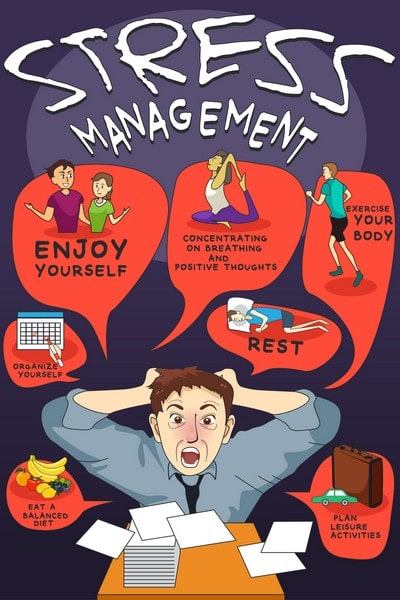Stress: a mindful approach with meditation for stress
Published on March 16, 2020 – Last Updated on January 4, 2024
We’ve all been there. We experience a problematic situation, and suddenly our heart rate speeds up, our breathing becomes shallow, and we feel like we can’t get a grip on ourselves. This is how some people live their everyday lives – struggling with stress and anxiety. While there are many ways to deal with stress, one approach that is gaining popularity is mindfulness meditation for stress. This meditation helps you focus on the present moment and not let your thoughts run away with you. It can be a helpful tool for learning how to cope with stress healthily. This blog post will explore mindfulness meditation, how it can help you reduce stress, and some tips for getting started.
Stress is terrible for your physical and mental health. Meditation is a healthy way to relieve stress and create positive outcomes. Numerous studies have established a link between meditation and stress reduction.
Stress is the body’s response to anything that challenges our comfort zone. Therefore, we need to recognize when we face a situation that triggers our stress because if we ignore those feelings, they can manifest as physical or mental health problems.
Meditation introduces mindfulness, a practice that allows us to be more present in the moment and aware of what is going on around us.
Mindfulness meditation for stress: be in the present moment
Mindfulness meditation programs have been shown to reduce stress, anxiety, and depression. In addition, the results from numerous studies suggest mindfulness can help manage negative emotions such as anger, regret, guilt, and confusion.
The body releases cortisol when we are under stress. Cortisol is a necessary part of our survival and adaptive response system because it activates us to respond quickly when we experience fear or anger. However, when cortisol levels remain high over time, they can become toxic and have long-term effects on health and well-being.
Stress and meditation practice during pregnancy
Numerous studies have shown that stress can have a negative impact on pregnancy. Expectant mothers who are under a great deal of stress are more likely to experience complications such as preterm labor and low birth weight. In addition, stressed pregnant women are also at increased risk for developing high blood pressure and other cardiovascular problems.
Given the potential consequences of stress during pregnancy, expectant mothers need to find ways to reduce their stress levels. One way to do this is through meditation. Research suggests that meditation can help reduce stress, improve sleep, and reduce anxiety. Additionally, meditation can also help to improve self-esteem and body image. For expectant mothers who are looking for a natural way to reduce their stress levels, meditation may be an ideal solution.
To provide stress relief for pregnant women, our partners have developed Hypnobirthing App TL, which we have rated as the best hypnobirthing app. Not only does it help you with stress management, but it also helps you to have a relaxed and comfortable birthing experience by teaching you the best contraction techniques. They also have included a contraction tracker app which is free to download and use. So, if you want a relaxed pregnancy, we recommend integrating guided meditation sessions into your pregnancy routines.
Overview of Stress

illustration of stress management infographic
Stress is natural. For the most part, our stress is called Eustress or good stress. Good stress is temporary and comes with good things like planning a wedding or getting ready for a vacation. Negative and prolonged stress happens when something goes wrong, such as getting stuck in traffic and being late for work.
When your brain perceives a threat, the primitive brain takes over and goes into fight or flight mode. This stress response prepares your body to stay and deal with the threat or run away. The primitive brain does not know the difference between real and perceived threats. The stress hormone will trigger something significant like a car accident or something minor like an argument with your kids.
Managing stress can be difficult if you don’t have a plan, so why not try an app? Check out our post about the best apps for anxiety.
This is how your body reacts to negative stress:
- The parasympathetic nervous system is activated.
- Adrenaline and noradrenaline (hormones) are released.
- An increase in heart rate and breathing rate may be indicative of heart failure and weight gain.
- The body tenses up, ready for action.
- It can take up to 60 minutes for your body to calm down and get back to normal.
- Your daily routine is affected by these physical health conditions.
Mindfulness for stress is a proven method to combat stress.
Mindfulness meditation can help with stress because it changes how we respond to the world around us. When you practice mindfulness, you recognize what triggers your anxiety to prepare yourself. If you know what causes your emotional response, you can inhibit the stress response.
Mindful people are less likely to respond to stress with runaway emotions with adverse outcomes.
According to Mindful, “We train our brain to stop automatically following this well-trodden path of habitual, unconscious reaction and instead forge a new path toward healthier responses.”
This is how regular meditation practice works:
- Focusing on the present moment.
- Trust that you can handle whatever comes your way.
- Releasing judgment and accepting things as they are in the moment.
- Regular practice of being aware of when stress is triggered and recognizing it when it happens.
- The best part about mindfulness is that anyone can practice it.
- There are a variety of ways to get started. One of the easiest ways is to start paying attention simply.
The next time you are in line at the grocery store or waiting for your coffee, take a moment and notice what is happening around you. Notice the colors of leaves on trees, cars passing by, and sounds coming from people talking around you. Once you develop this increased awareness of the many benefits of meditation, you can easily integrate those into your life.
Mindful Healing of Stress
Meditation and breathing exercises can help with stress. There are numerous breathing techniques that can be used to reduce stress. One of the most popular is called 4-7-8 breathing. Here’s how it works:
Inhale deeply for a count of four.
Hold your breath for a count of seven.
Exhale slowly and fully for a count of eight.
Also, guided meditation can help you to relax and reduce stress while pregnant. Taking time out for yourself is essential when you’re expecting a baby, as it allows you to focus on your health and well-being, as well as the growth of your little one inside. Guided meditation helps connect you with your baby and can reduce your overall stress levels.
Crystals for stress can also help you manage high-stress situations. The benefits of meditation on your health are tremendous. Studies have found that meditation decreases stress and anxiety, increases focus, reduces inflammation, improves sleep quality, and even boosts your immune system.
Here are more easy meditation deep breathing exercises:
Start by breathing slow in through your nose and out through your mouth.
Get in a comfortable position (lay down or sit up straight but comfortably). Close your eyes and focus on the sensation of breathing. Notice what you feel as you breathe in and out.
Follow along with this 10-minute meditation:
Begin by noticing what is going on around you. Next, see your feet and how they feel as they touch the floor. Then move up to catch the sensations in your legs and hips. Continue this process of focusing on each part of your body until you’ve moved through every inch of it, then slowly begin to bring yourself back into focus on the world around you.
This is an excellent practice for noticing your thoughts and emotions. It will help you on bad days when you feel overwhelmed or on good days when life feels that much sweeter.
You’ll have more energy to be creative, productive, and healthy by nurturing yourself daily!
Mindful healing is the key to taking back control over stress.
Meditation for Stress
Chronic stress happens when you are under stress daily. When stressed out, your body doesn’t return to its normal functions; it stays heightened more. Chronic stress is what causes a lot of health problems. With our handpicked guided meditations for stress, you will be able to alleviate the impact of stress & anxiety on your daily life. You can control stress with our meditation app MindTastik.
Meditation is an effective way to manage stress. In one scientific research, people who participated in eight weeks of mindfulness training had lower levels of the stress hormone cortisol than those who did not receive the training. Meditation can also help to improve mental health conditions such as anxiety and depression. In addition, it can help to reduce chronic pain. While there are many different types of meditation, most involve focusing on the breath and being aware of thoughts and sensations without judgment. With regular practice, meditation can help to reduce stress and improve overall well-being.
Symptoms of Chronic Stress
Sometimes, it’s not apparent when you have chronic stress because it’s your routine. These are some of the symptoms that you may be under chronic stress:
- Headaches
- Problems falling or staying asleep
- Difficulty concentrating
- Irritability (can be excessive)
- Digestive problems
- Change in eating habits
- The feeling that you don’t have any control
- Getting sick frequently
Many things can cause chronic stress. Some potential causes of chronic stress are:
- A demanding job with deadlines
- Financial difficulties
- Being a caregiver
- Being in a difficult relationship
- Having a chronic illness
- Stresses Impact on Health
Learning to manage your stress is vital to your health. Many chronic health conditions stem from stress. When you have chronic stress, your body doesn’t get to the point where it goes back to a restful state because the stress is constant. This means that the body doesn’t get a chance to heal and repair itself. Over time, stress takes its toll on your health. A great way to learn how to manage stress is to practice meditation. Even if you are a beginner, our app will help you find comfort in meditation. Here are some of the conditions that can develop with chronic stress.
Heart Disease

One in four deaths is related to heart disease. Coronary Heart Disease is the number one cause of death globally. Heart disease encompasses several types of heart conditions. Stress does not necessarily cause heart disease, but heart disease can result from stress.
When you are stressed, your body releases a hormone called cortisol. If you have long-term stress, high cortisol levels can increase cholesterol, triglycerides, blood sugar, and blood pressure. These factors are all common in heart disease. Stress can also create changes that promote plaque build-up in the arteries. By practicing meditation for stress & anxiety with consistency, you will handle stress objectively.
High Blood Pressure
Because stress raises your blood pressure, experiencing chronic stress can keep your blood pressure high for an extended time. This can cause damage to the blood vessels. High blood pressure often does not have symptoms, but the complications are numerous, including:
- Kidney disease
- Stroke
- Vision loss
- Heart failure
In a systematic review of blood pressure and stress, researchers concluded that individuals who had a more robust response to tasks causing stress were 21% more likely to develop a higher blood pressure increase than those who were less stressed when they completed studies.
Obesity
How much someone should weigh depends on several factors, including age, gender, and height. Obesity is an epidemic in the US, affecting 1 in 3 adults.
In a study done in the UK, researchers took hair samples from 2,527 men and women that equaled two months’ worth of hair growth. The study was done over four years. Each time researchers took a hair sample, they checked cortisol levels. They found that individuals with higher cortisol levels had a larger waist circumference.
In another study, researchers found a correlation between high cortisol levels and obesity and metabolic syndrome.
Other stress-related conditions are:
- Diabetes
- Gastrointestinal problems
- Insomnia
- Anxiety
- Depression
- Alzheimer’s Disease
Not only our app has tens of meditations on stress & anxiety, but it also contains weight loss and eating disorders meditation. The topics include: Beat anorexia, Beating bulimia, Decrease your appetite, Eat slowly, Eating due to depression, Eliminate unhealthy eating habits, Weight loss hypnosis, and extended meditation. You can also check our article on mindful eating, which provides healthy eating tips.
Meditation for Stress will help you navigate stress and achieve inner peace

There are several things you can do to help manage stress, but learning to manage stress with meditation will make you a happier person and make you a healthier person. In the late ’70s, Mindfulness-Based Stress Reduction (MBSR) was born.
Meditation has since become one of the most popular ways to relieve stress. Learning to calm your body and mind can help dissolve your emotional and physical stress. After meditating, you feel better and can take on the challenges ahead more readily.
Meditation involves being still and quieting the mind. Meditation sessions can be any length but should be at least 5 minutes. The more you practice meditation, the more benefits you get from it.
When you feel stressed, and your body goes into the stress response, meditation does the opposite; it triggers the relaxation response. This allows the body time to repair itself, so no further physical damage is done.
Studies have shown how beneficial meditation for stress can be. You can enjoy guided meditations for stress and anxiety for FREE with our best meditation apps. Download our meditation app by clicking here
The Takeaways
Stress is a fact of life, but it doesn’t have to take over. By utilizing mindfulness meditation for stress, you can be more present and less reactive when stressful situations inevitably arise. And as a bonus, if you start a meditation practice during pregnancy, you may be able to reduce some of the adverse effects of stress on your mental and physical health. Don’t let stress get the best of you – try mindfulness meditation today! Feel free to let us know how it goes or if you have any tips on managing stress.


